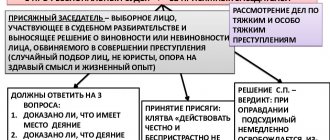The main task facing the employees of the Bailiff Service is to ensure the principle of legality. The breadth of their official powers allows them to ensure the established procedure for the activities of courts and carry out forced execution of court decisions. When faced with the use of force by bailiffs, it is important to be able to assess the legality of such actions and protect your own rights.
Hotline for citizen consultations: 8 (800) 200-46-92
Chain “debt – court – bailiff”
Many fellow citizens have unfulfilled debt obligations. These could be loans and borrowings, unpaid alimony, rent arrears, fines, etc. Each debtor has his own reasons for insolvency, but when the parties cannot resolve the issue through a claim procedure, the case is sent to court.
The proceedings last for more than one month, and if the plaintiff’s demands are legitimate, they are provided with a full package of documents, the court makes a decision on forcibly collecting debts. The writ of execution with the decision is sent to the bailiff service. In this case, losing part of the property to cover the debt is a real prospect, because the powers of the bailiffs also imply this scenario.
No matter how the clouds gather over your head, self-control and knowledge of the regulatory framework regulating the activities of the FSSP will help you get out of the situation with the least losses, as well as avoid violations of rights.
How to punish a bailiff for illegal actions
Faced with infringement of their own rights during enforcement proceedings, citizens want to punish the bailiff. However, a more advantageous position is to restore the rule of law. It must be understood that most violations by the bailiff are regarded as official misconduct, and not criminal acts.
The punishment for such procedural violations should be a disciplinary sanction, but bringing to disciplinary liability is the right, and not the obligation, of the head of the FSSP department. In most cases, due to lack of personnel, management turns a blind eye to minor misdeeds of its employees.
The legislation of the Russian Federation offers several tools for protection against illegal actions of bailiffs:
- application in order of subordination - the application is submitted directly to the senior police officer of this FSSP unit;
- application to the prosecutor's office - if violations are detected, the prosecutor's office takes response measures, including sending requests to cancel erroneous decisions or going to court to resolve the issue;
- the statement of claim is sent to a court of general jurisdiction (or to an arbitration court if one of the parties to the case is a legal entity) operating in the territory of the location of the corresponding FSSP unit.
Law is law
The powers of the federal bailiff service affect the complex property and financial sphere of legal and public interests of citizens and legal entities. The enforcement measures are harsh and cause great public outcry. Therefore, the activities of the FSSP are regulated by an extensive legislative framework:
- Constitution of the Russian Federation;
- Federal Law No. 118 “On Bailiffs”;
- Civil Code and Civil Procedure Code;
- Code of Administrative Offenses of the Russian Federation;
- Federal Law No. 135 “On Valuation Activities”;
- Regulations on the Federal Bailiff Service;
- Regulatory acts of the Ministry of Justice.
Bailiffs also rely on other laws, regulations, instructions and orders.
Armed with such impressive support from the state and having come into the life of a financially insolvent citizen, bailiffs describe in detail the terms of their powers, paint in black colors the sad fate of the defendant, keeping silent about the rights of the latter. But they exist!
The defendant should first look at the Federal Law “On Enforcement Proceedings”. The document describes in detail the rights and obligations of the debtor, and the capabilities of bailiffs.
Powers of bailiffs
Article 12 of the Federal Law “On Bailiffs” provides for the following rights of an official to collect debts:
- Process personal data of the debtor. Obtaining the data must be caused by measures to implement a court decision. The bailiff has the right to make inquiries to banks and other financial institutions regarding the availability of deposits, shares, and other financial instruments owned by the debtor. The executors are actively interacting with the traffic police service to identify the defendant’s movable property. A representative of the executive branch may make requests to other departments.
- Summon the debtor and other persons involved in the proceedings to the FSSP unit with a summons.
- The powers of bailiffs when collecting a debt allow them to request a citizen’s property declaration. Providing false information is subject to criminal liability in the form of a criminal fine of up to 100 thousand rubles or compulsory labor of up to 180 hours.
- Put the debtor and his property on the wanted list. Until 2011, only law enforcement agencies looked for defendants in court orders, but Dmitry Medvedev (President of the Russian Federation in those years) transferred such responsibilities to bailiffs. The FSSP also has the right to search for unlawfully detained minors in cases where there is a court decision to return the child to the applicant.
- Recently, bailiffs have been empowered to enter the premises of debtors (owned or occupied by them) and inspect them, and, if necessary, open them.
- After this, it is possible to seize the property and transfer it for storage or sell it.
- The resolution of November 17, 2015 of the Supreme Court of the Russian Federation allows for the seizure or prohibition of orders on the debtor’s only home or other real estate. The land where the sanctioned facility is located (unless, of course, it is a private house or cottage) also falls under this action.
- Seizure may be placed on the debtor's bank or other financial accounts, vehicles and real estate. Measures are being taken to withhold part of the salary to pay off the debt.
- Article 67 on enforcement proceedings provides for the restriction by bailiffs of the travel outside the Russian Federation of a person with unpaid debts of more than 10,000 rubles. Their powers include sending the debtor a resolution on such a decision on the basis of a judicial act. The restriction is introduced only for non-property debt: credits, loans, fines, alimony.
- On January 15, 2021, Federal Law No. 340 came into force, which provides the opportunity to restrict the right to drive vehicles of all categories and types of citizens who do not fulfill debt obligations in the amount of 10,000 rubles or more. You will have to walk until the person pays off the court's demand. However, if transport is the only source of income, it will not be possible to limit the driver’s license. The resolution on such a decision must be handed to the defendant personally against signature, with a 5-day period provided after this for getting rid of debt encumbrances.
If a FSSP officer used force
During enforcement procedures, FSSP employees have the right to use force to detain the debtor or repel his attack, as well as to force the implementation of legal enforcement actions. Thus, the Law “On Compulsory Enforcement Bodies...” No. 118 defines a number of cases in which a bailiff can use combat techniques, firearms or a means of special protection against a citizen.
Federal Law No. 328 “On Service in Compulsory Enforcement Bodies...”, which came into force on January 1, 2021, actually equated the FSSP to a law enforcement agency. Already today, bailiffs have the right to break down doors and enter a house without the consent of the debtor. According to political analysts, the powers of bailiffs to use force will be expanded in the near future. Given great opportunities and a corrupt personnel structure, it is quite likely that FSSP officers will start beating civilians.
A citizen who is faced with the use of force by a bailiff must honestly assess the legality of the civil servant’s actions and, depending on the result of the assessment, develop a plan of behavior.
| The legality of the actions of an FSSP employee | The actions of the bailiff are lawful | The bailiff has exceeded his authority or is inactive | A malfeasance has occurred |
| Recommendations for the debtor to protect his own interests | There is no point in complaining and challenging the use of force; all available resources should be directed to paying off the debt. | File a complaint with a superior, challenge the bailiff’s arbitrariness in court, or contact the prosecutor’s office. | You can report a crime directly to the FSSP. However, it is recommended to immediately contact the Ministry of Internal Affairs or the Investigative Committee. |
How debtors' rights are violated in enforcement proceedings
- The bailiffs seized property that was prohibited from recovery by procedural law. These are products, household items, clothing, equipment for professional activities, transport for the disabled and some other things.
- The bailiff seized the accounts for the transfer of social benefits, the money was written off in full, and also without notifying the debtor of the decision with a copy of the resolution and without providing a mandatory 5-day period for repaying debts.
- Arrest without a resolution within the framework of enforcement proceedings (issued by a bailiff). Or the form of the Resolution does not correspond to the model established by law.
- The arrest must be carried out in the presence of witnesses.
- Inspection, inspection and search of premises are different procedural actions. If the bailiffs turn everything upside down, challenge the actions of the employees in court.
- Inventory of property owned by third parties. In this case, the abuse of power by bailiffs is challenged through the competent authorities. The guarantor for loans is liable equally with the debtor.
- In general, the debtor has 10 days to appeal the arrest procedure. Statistics show that there is more than enough abuse, intentional or due to low qualifications of bailiffs . Therefore, in 70% of cases, courts partially or fully satisfy the claims of a citizen who has lost his property. The debtor also has the right of priority to purchase the property at auction. As a rule, a seized TV and other things are sold for next to nothing, and the person or his relatives have every right to “buy back” what they lost. The FSSP has no right to refuse. Rights
Illegal actions of bailiffs
Based on judicial practice and statistics from the FSSP website, most often the following actions of bailiffs are grounds for appeal:
- erroneous accrual of performance fees;
- unlawful initiation (or termination) of an individual entrepreneur;
- illegal seizure of property (incomparable in price or not belonging to the debtor);
- erroneous debiting of money from bank accounts;
- sale of seized property at a reduced price (below the market price);
- failure to comply with IL requirements;
- return of IL to the plaintiff due to impossibility of collection.
Rights of the defendant before the FSSP
When bailiffs get down to business, their powers have certain limits. The opportunity for a citizen to defend himself is provided by Article 50 of the Law on Enforcement Procedure. A citizen has the right:
- Familiarize yourself with the package of documents of the enforcement case;
- Make statements;
- Make copies of documents;
- During the process, submit petitions and provide additional papers and materials;
- During the enforcement process, provide explanations in written or oral form (the first is preferable);
- Provide your own reasons for non-payment of debt on paper;
- File objections to the actions of participants in the enforcement case;
- File a settlement through the court with the plaintiff during the execution of the decision on collection;
- Appeal decisions of FSSP officials, make challenges, submit applications.
Ingenuity and loyalty to the rescue
The bailiff informs (calls) the participants in the case about upcoming legally significant actions of enforcement proceedings through modern means of communication, by summons, or by telegram.
Notices on paper are delivered in person against signature. A representative of the FSSP can also transfer papers to an adult family member living together against his signature and with his consent.
Recent changes to the enforcement process give bailiffs the power to seize property without prior notice. However, within the next period after the inventory, the worker defendant will be notified of the actions that took place in documents. It does not matter whether a person was present during the procedure or not.
When an arrest is unavoidable, we advise you to remove all valuables from your home. You can hide them too. Government officials do not have the right to search a home without a search document. It is possible, for example, that the refrigerator was purchased on credit in the name of another person. He is not yours - he is not subject to arrest. But this will need to be documented, showing a loan agreement, a receipt from the store, or a purchase and sale document.
If bailiffs arrive, do not insult the bailiffs while performing their powers, do not threaten. Don't even think about starting a fight. Such actions are fraught with criminal liability with a real sentence.
We recommend building a constructive relationship with the FSSP at the entire stage of the enforcement case. Representatives of the service will meet the needs of loyal debtors halfway and provide the opportunity for significant installment plans to repay the debt.
Difference between abuse of power and similar types of crimes
Bibliographic description:
Zerina, A. S. Difference between abuse of power and similar types of crimes / A. S. Zerina. — Text: direct // Law: modern trends: materials of the VI International. scientific conf. (Krasnodar, October 2021). — Krasnodar: Novation, 2021. — pp. 49-51. — URL: https://moluch.ru/conf/law/archive/311/14501/ (access date: 12/21/2021).
Abuse of power should be distinguished from similar types of crimes. Basically, in judicial practice, problems arise in delimiting the crimes provided for in Art. 201 of the Criminal Code of the Russian Federation against theft provided for in Part 3 of Art. 159 and part 3 of Art. 160 of the Criminal Code of the Russian Federation.
An explanation for this issue is given by the resolution of the Plenum of the Supreme Court of the Russian Federation dated October 16, 2009 N 19 “On judicial practice in cases of abuse of official powers and exceeding official powers”, determining that, in contrast to the theft of someone else’s property using one’s official position, abuse of power out of selfish interest is formed such acts of an official that are either not related to the seizure of someone else’s property (for example, receiving property benefits from using property for other purposes), or are related to the temporary and (or) paid seizure of property.
If an official’s use of his official powers resulted in the theft of someone else’s property when it was actually confiscated, the act is fully covered by Part 3 of Article 159 of the Criminal Code of the Russian Federation or Part 3 of Article 160 of the Criminal Code of the Russian Federation and does not require additional qualification under the article providing for liability for exceeding official powers [ 1].
In cases where an official, using his official powers, along with the theft of someone else's property, committed other illegal actions related to the abuse of official powers out of selfish or other personal interest, what he did should be qualified according to the totality of these crimes.
These clarifications related to Art. 285 and art. 286 of the Criminal Code of the Russian Federation are fully applicable to Art. 201 of the Criminal Code of the Russian Federation, since selfish interest and the goal of extracting benefits for oneself or other persons are similar.
Thus, if a person performing managerial functions in a commercial or other organization received a property benefit through the illegal gratuitous transfer of property into his own property, then his actions should constitute theft of someone else’s property. The validity of this conclusion is confirmed by judicial practice.
Thus, the director of the store of CJSC VK "Omtor" A., using her official position, repeatedly misappropriated the money and inventory items entrusted to her, which she spent on personal needs. For this purpose, she did not carry out invoices for the supply of goods based on commodity reports, and drew up unjustified acts of write-off and markdown of goods. The preliminary investigation authorities qualified her actions under paragraph 2 of Art. 201, paragraph 3 of Art. 327 and paragraph 3 of Art. 160 of the Criminal Code of the Russian Federation. However, the court excluded Part 2 of Art. from the charges against A. 201 of the Criminal Code, since its actions are fully covered by paragraph 3 of Art. 160 CC. In this case, A.’s actions were qualified twice, although theft of property cannot be an abuse of power under Art. 201 of the Criminal Code of the Russian Federation, since it involves the gratuitous seizure of someone else’s property. The same act cannot be simultaneously assessed as abuse of power and theft of someone else’s property [2].
At the same time, it should be taken into account that if two independent crimes are committed, namely abuse of power and theft, then they should be classified as a whole.
As an example, we can cite the verdict of the Kovrovsky District Court of the Vladimir Region.
So, A. worked as the head of the city sewerage service of the Vodokanal municipal unitary enterprise. Knowing that a cast iron pipe had been dismantled from one of the facilities and placed on the water intake area, he secretly stole it and used it to lay a sewer line along individual residential buildings. To carry out the work, K. illegally hired equipment and municipal unitary workers who were not aware of his intentions. Having completed the laying of a sewer line with a total length of 460 m, K. received funds in the amount of 210 thousand rubles from the owners of the houses. His actions were classified as a combination of crimes such as theft - Art. 158 of the Criminal Code of the Russian Federation and abuse of power - Art. 201 of the Criminal Code of the Russian Federation.
In this case, there is an abuse of power, expressed in the use, thanks to official powers, of equipment and labor of employees belonging to the enterprise without appropriate payment for these services. Thus, the goal of extracting material benefits was realized. Theft by theft consisted of the illegal, gratuitous seizure of a cast iron pipe [3].
Many problems in law enforcement practice arise when deciding on the totality of the crime provided for in Art. 201 of the Criminal Code of the Russian Federation with causing property damage by deception or abuse of trust, since abuse of power has both common and distinctive features with causing property damage by deception or abuse of trust in the absence of signs of theft and is correlated as general and special norms, which creates certain difficulties in qualifications.
Article 165 of the Criminal Code of the Russian Federation provides for the general case of causing property damage by deception or abuse of trust, but in the criminal code there are also special types of causing property damage by special subjects, the essence of which is that a person, illegally using his powers, causes damage, including number and property. And in this case, it is precisely the abuse of power that occurs, therefore the difference in Art. 165 of the Criminal Code of the Russian Federation occurs according to the characteristics of the subject, which in Art. 201 is special, and in Art. 165 - total. However, since the consequences in Art. 201 of the Criminal Code of the Russian Federation is more voluminous and includes not only property damage, but also other damage, then Art. 202 cannot be attributed in its pure form to special rules in relation to Art. 165. However, if the abuse is expressed in causing property damage, then these rules are special in relation to Art. 165 of the Criminal Code of the Russian Federation [4].
According to the current criminal legislation, when there is competition between general and special norms, liability arises according to the special norm. The general norm is wider in scope, that is, it covers a larger range of acts than the special one, but the latter contains more features, due to which it stands out from the general norm. If the crime does not contain any sign of a special norm, the general norm is applied. A special norm replaces a general norm only when the committed act contains all the signs of a special norm [5].
In judicial practice, the question arises whether it is necessary to qualify socially dangerous acts associated with causing property damage through deception or abuse of trust, committed by a private notary or private auditor as a set of crimes. It seems that the classification in the aggregate will be incorrect, since the subject of causing property damage can only be a private person, and not a person with certain powers. If such an act is committed by a person performing managerial functions in a commercial or other organization, in this case there will be both property relations and normal activities of government bodies. In this case, a distinction is made based on the second criterion—the object of the crime. Violation of three different types of social relations, however, cannot determine the classification of crimes committed as a whole. This is explained by the fact that a person performing managerial functions encroaches not only on the normal activities of government bodies, but also violates property relations. The damage caused to these relations is a consequence of a violation of normal notarial and auditing activities, therefore, all those social relations that suffer damage from such abuse do not form an independent object, along with the normal activities of organizations and government bodies, but are included in it as an integral part . Consequently, the infliction of property damage by a special subject cannot be considered as an act that violates two independent objects. In such cases, the object is the same - the normal activities of private notaries and private auditors. It follows that the infliction of property damage by a person abusing his powers must be qualified under the article providing for liability for abuse of powers, that is, under Art. 201 of the Criminal Code of the Russian Federation.
In the event that deception or breach of trust is committed by a person performing commercial functions in a commercial or other organization, but not in connection with his official activities and, accordingly, without the use of official powers, and as a result of this, property damage is caused to the owner or other owner of the property and there are no signs of theft, criminal liability arises under Art. 165 of the Criminal Code of the Russian Federation.
Literature:
- Ageshkina N. A., Belyaev M. A., Belyaninova Yu. V., Biryukova T. A., Boldyrev S. A., Buranov G. K., Vorobyov N. I., Galkin V. A., Dudko D. A., Egorov Yu. V., Zakharova Yu. B., Kopyev A. V. Scientific and practical commentary to the Criminal Code of the Russian Federation of June 13, 1996 N 63-FZ. — Especially for the GARANT system, 2021.
- Review of practice and recommendations for the investigation of criminal cases of abuse of power in commercial and other organizations (Article 201 of the Criminal Code of the Russian Federation) St. Petersburg.
- Generalization of judicial practice in criminal cases of abuse of powers of the courts of the Vladimir region for 2014.
- Pautova E. V. Crimes against the interests of service in commercial and other organizations: commentary on Chapter 23 of the Criminal Code of the Russian Federation, “Right of Access”, 2021.
- Commentary on the Criminal Code of the Russian Federation (article-by-article). 5th edition, revised and expanded. The author of the comments and compiler is A. B. Borisov. M.: Knizhny mir, 2012. P. 599.
Key terms
(automatically generated)
: Criminal Code of the Russian Federation, abuse of power, property damage, someone else's property, breach of trust, special rule, authority, judicial practice, official, general rule.
The bailiff is abusing: complain
When bailiffs do exceed their powers, a citizen has a real chance to challenge the actions of representatives of the executive branch. A complaint can be submitted to several authorities at once: to a higher-ranking official of the FSSP, to the prosecutor's office and the court.
The document states:
- data of the bailiff, resolution number, actions taken by him;
- Full name of the defendant, his address;
- Composition of violations of rights, reasons for appealing decisions, actions of bailiff representatives.
Abuse of authority is a serious misconduct. But for a complaint to have any effect, it must be drafted correctly. Therefore, if possible, it is better to resort to friends and colleagues.
Who compensates for damage from illegal actions
To compensate for damage caused by unlawful decisions, actions or inactions of a bailiff, it is necessary to file a claim in court. The defendant in such a claim should be the Ministry of Finance of the Russian Federation, and the co-defendant should be the territorial Department of the FSSP. In the event of a positive court decision, compensation for damage is made from budget money from the treasury of a particular municipality.
This you need to know: How to return money withdrawn from a card by bailiffs
Articles:
How to remove a seizure from real estate imposed by a bailiff
Certificate from the bailiffs about non-payment of alimony
Still, it’s better not to “get caught”
No matter how hard a debtor tries to avoid collecting overdue payments and loans, he still has to pay. Serious restrictive measures on the part of the state for debtors and the expanding powers of bailiffs from year to year leave no chance for defaulters.
If the debt is completely unmanageable, you can turn to personal bankruptcy . In general, it is better not to fall into a debt trap. Pay apartment bills and child support on time, and in an effort to satisfy consumer demands through lending, you should soberly calculate your own financial capabilities.






